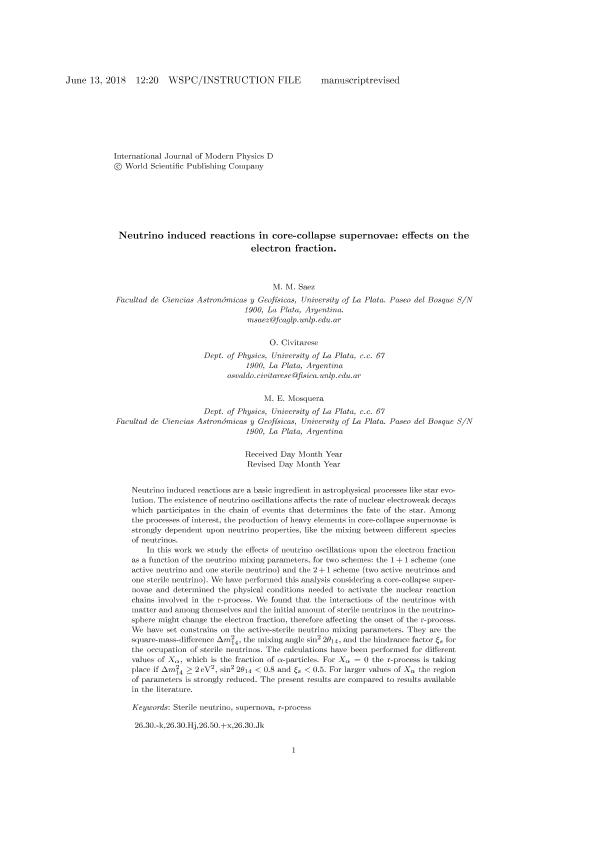Mostrar el registro sencillo del ítem
dc.contributor.author
Saez, M. M.
dc.contributor.author
Civitarese, Enrique Osvaldo

dc.contributor.author
Mosquera, Mercedes Elisa

dc.date.available
2019-10-18T13:57:11Z
dc.date.issued
2018-07
dc.identifier.citation
Saez, M. M.; Civitarese, Enrique Osvaldo; Mosquera, Mercedes Elisa; Neutrino-induced reactions in core-collapse supernovae: Effects on the electron fraction; World Scientific; International Journal of Modern Physics D; 27; 12; 7-2018; 1850116-1850133
dc.identifier.issn
0218-2718
dc.identifier.uri
http://hdl.handle.net/11336/86308
dc.description.abstract
Neutrino-induced reactions are a basic ingredient in astrophysical processes like star evolution. The existence of neutrino oscillations affects the rate of nuclear electroweak decays which participates in the chain of events that determines the fate of the star. Among the processes of interest, the production of heavy elements in core-collapse supernovae is strongly dependent upon neutrino properties, like the mixing between different species of neutrinos. In this work, we study the effects of neutrino oscillations upon the electron fraction as a function of the neutrino mixing parameters, for two schemes: the 1+1-scheme (one active neutrino and one sterile neutrino) and the 2+1-scheme (two active neutrinos and one sterile neutrino). We have performed this analysis considering a core-collapse supernovae and determined the physical conditions needed to activate the nuclear reaction chains involved in the r-process. We found that the interactions of the neutrinos with matter and among themselves and the initial amount of sterile neutrinos in the neutrino-sphere might change the electron fraction, therefore affecting the onset of the r-process. We have set constrains on the active-sterile neutrino mixing parameters. They are the square-mass-difference ∆m^2_14 , the mixing angle sin^2(2θ_14), and the hindrance factor Xi_s for the occupation of sterile neutrinos. The calculations have been performed for different values of X_alpha, which is the fraction of alpha particles. For X_alpha=0 the r-process is taking place if ∆m^2_14 ≥ 2 eV^2 , sin^2(2θ_14) < 0.8 and Xi_s < 0.5. For larger values of X_alpha the region of parameters is strongly reduced. The present results are compared to results available in the literature.
dc.format
application/pdf
dc.language.iso
eng
dc.publisher
World Scientific

dc.rights
info:eu-repo/semantics/openAccess
dc.rights.uri
https://creativecommons.org/licenses/by-nc-sa/2.5/ar/
dc.subject
STERILE NEUTRINO
dc.subject
SUPERNOVA
dc.subject
R-PROCESS
dc.subject.classification
Astronomía

dc.subject.classification
Ciencias Físicas

dc.subject.classification
CIENCIAS NATURALES Y EXACTAS

dc.title
Neutrino-induced reactions in core-collapse supernovae: Effects on the electron fraction
dc.type
info:eu-repo/semantics/article
dc.type
info:ar-repo/semantics/artículo
dc.type
info:eu-repo/semantics/publishedVersion
dc.date.updated
2019-09-27T14:35:55Z
dc.journal.volume
27
dc.journal.number
12
dc.journal.pagination
1850116-1850133
dc.journal.pais
Singapur

dc.journal.ciudad
London, UK
dc.description.fil
Fil: Saez, M. M.. Universidad Nacional de La Plata. Facultad de Ciencias Astronómicas y Geofísicas; Argentina
dc.description.fil
Fil: Civitarese, Enrique Osvaldo. Universidad Nacional de La Plata. Facultad de Ciencias Exactas. Departamento de Física; Argentina. Consejo Nacional de Investigaciones Científicas y Técnicas. Centro Científico Tecnológico Conicet - La Plata. Instituto de Física La Plata. Universidad Nacional de La Plata. Facultad de Ciencias Exactas. Instituto de Física La Plata; Argentina
dc.description.fil
Fil: Mosquera, Mercedes Elisa. Universidad Nacional de La Plata. Facultad de Ciencias Astronómicas y Geofísicas; Argentina. Consejo Nacional de Investigaciones Científicas y Técnicas; Argentina
dc.journal.title
International Journal of Modern Physics D

dc.relation.alternativeid
info:eu-repo/semantics/altIdentifier/doi/http://dx.doi.org/10.1142/S021827181850116X
dc.relation.alternativeid
info:eu-repo/semantics/altIdentifier/url/https://www.worldscientific.com/doi/10.1142/S021827181850116X
Archivos asociados
